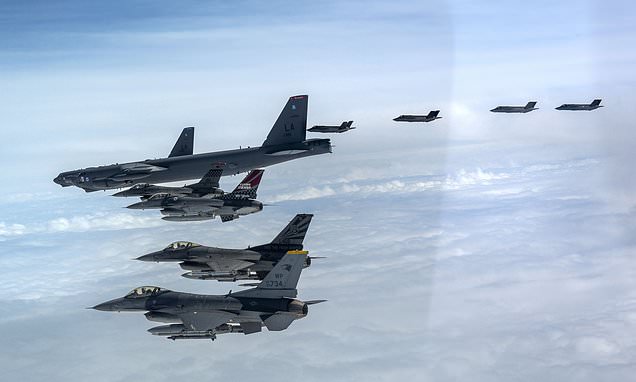Moscow ‘sends fighter jets to intercept US strategic bombers over the Baltic Sea’ – hours after Japan scrambled jets to track Russian spy plane spotted off its coast
- The Russian defence ministry said it had scrambled Su-27 and Su-35 fighter jets
Russia said today it had sent fighter jets to stop two US strategic bomber planes from ‘violating the state border’ over the Baltic Sea, in the second such incident this week.
The Russian defence ministry said it had scrambled Su-27 and Su-35 fighter jets, saying it identified ‘the air targets as two US Air Force B-1B strategic bombers’.
A basic principle of international air law is that every state has complete and exclusive sovereignty over the airspace above its territory, including its territorial sea, according to the International Civil Aviation Organisation.
‘The violation of the state border was prevented,’ the defence ministry said.
After the decision, the Russian fighters ‘returned safely to their air base.’

Russia said today it had sent fighter jets to stop two US strategic bomber planes from ‘violating the state border’ over the Baltic Sea, in the second such incident this week

Similarly, Japan said it had scrambled fighter jets after detecting Russian ‘intelligence gathering’ planes off its coastline along the Pacific Ocean and Sea of Japan
It added that the flight was ‘carried out in strict accordance with international rules for the use of airspace.’
It is the latest in a series of similar incidents, with Moscow saying it had intercepted several Western jets near the Baltic in recent weeks.
Similarly, Japan said it had scrambled fighter jets after detecting Russian ‘intelligence gathering’ planes off its coastline along the Pacific Ocean and Sea of Japan.
One Russian aircraft travelled from Japan’s north down along part of its west coast, while the other took a similar route along the opposite coast and returned the same way, the Joint Staff office run under the defence ministry said in a brief statement.
‘In response, fighters of the Air Self-Defence Force’s Northern Air Force and other units were scrambled,’ it added.
It comes after the head of Russia’s Wagner mercenary group said his troops had started transferring their positions in the flashpoint eastern Ukraine city of Bakhmut to the Russian military.
In Bakhmut, Wagner said it began pulling out its fighters after claiming to have fully captured the destroyed city at the weekend.
Ukraine, which denies that Bakhmut has fallen to Russia, insisted it still controlled a ‘micro district’ of the ruined city and said it was still advancing on the flanks.
The battle for Bakhmut has raged for nearly a year, levelling the city and decimating waves of Wagner recruits who have led Russia’s assault on the industrial hub.
‘We are withdrawing units from Bakhmut today. We are handing over positions to the military, ammunition and everything,’ Wagner boss Yevgeny Prigozhin said in a video.
‘We pull back, we rest, we prepare and then we will get new tasks,’ added Prigozhin, who was dressed in tactical body armour and a military helmet.
Earlier this week, he conceded that around 10,000 prisoners he had recruited to fight in Ukraine had been killed on the battlefield.
The 61-year-old Kremlin ally toured Russian prisons last year to persuade inmates to fight with Wagner in exchange for a promised amnesty on their return – should they survive.
Wagner’s announcement came days after Moscow’s military said it had deployed jets and artillery on Russian soil against a ‘sabotage’ group that crossed from Ukraine.
In Kyiv, President Volodymyr Zelensky accused Russia of terrorising Ukrainians by launching a new wave of Iranian-made attack drones at targets across his country.
‘The enemy continued to terrorise Ukraine by launching 36 Shaheds. None reached their target,’ Zelensky said on social media.
‘I’m grateful to our air defence forces for the 100-percent result.’
The Ukrainian military said Russia was probably targeting key infrastructure and military facilities in western Ukraine.
Russia subjected Ukraine to a campaign of aerial bombardments on infrastructure including energy facilities during the winter months but these attacks recently diminished.
Kyiv has become increasingly adept at taking down waves of Russian cruise missiles and drones after appealing to Western allies for greater air defence capabilities.
Separately, the Russian-installed head of Crimea announced that air defence had intercepted several drones targeting various parts of the territory annexed from Ukraine in 2014.
‘Six drones were shot down or blocked … in different parts of Crimea,’ Sergei Aksyonov announced on social media, adding that no one had been injured.
In Moscow, Russia’s FSB security service said it had arrested two Ukrainians who had allegedly planned to target nuclear power plants in the country.
The aim was to cause ‘serious economic harm to Russia and damage its reputation’, the FSB alleged in a statement.
In Japan, Tokyo’s military scrambled fighter jets, saying two Russian planes travelled along parts of its coastline, days after Zelensky took part in the G7 summit in Hiroshima.
Japan has joined Western allies in sanctioning Moscow over its Ukraine offensive.
Russia’s foreign ministry announced a visit to Moscow by China’s special envoy for Ukraine, Li Hui.
His visit to the Russian capital, where he is expected to meet the country’s top diplomat Lavrov on Friday, comes after Li met Zelensky in Kyiv.
Li has said there is ‘no panacea to resolve the crisis’.
Beijing and Moscow have recently drawn closer under a partnership that has served as a diplomatic bulwark against the West
President Xi Jinping visited Moscow in March and said ties were ‘entering a new era’.
While China says it is a neutral party in the Ukraine conflict, it has been criticised for refusing to condemn Moscow for its offensive.
Source: Read Full Article
